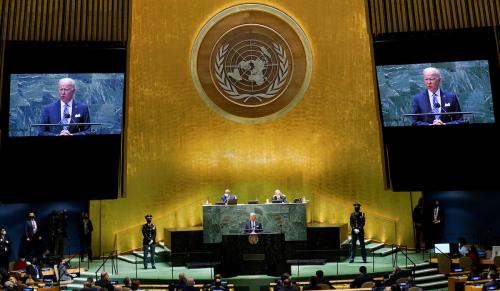The World Economic Forum’s Global Governance Initiative released a new report today that suggests the international community is failing to live up to its commitments to reduce poverty, protect the environment, ensure human rights, and improve health and education.
The report, which was released at a Brookings Briefing, gave a failing grade to global efforts to achieve humanitarian benchmarks such as those outlined the United Nation’s Millennium Development Goals, a 189-nation agreement signed in September 2000 that laid out specific goals to be achieved by 2015. According to the report, international efforts are only achieving a third of what is necessary to reach the UN targets.
The GGI’s report was a year-long effort spearheaded by forty experts from government, business, and international organizations. The experts ranked international progress on several initiatives on a scale of one to ten. No category earned a mark higher than four.
“These are pretty dire findings,” said Brookings Senior Fellow and GGI Director Ann Florini. “Not only are we failing, we are failing atrociously.” The report comes on the eve of the World Bank and International Monetary Fund Spring meetings, in which humanitarian and development assistance will be a prominent topic.
Florini spoke as part of a Brookings panel of experts that focused on how the U.S. could contribute to the GGI, because, as Florini said, it is “by far the dominant actor in the international system.”
Panelists agreed that the shortcomings outlined in the report posed disastrous consequences for everyone, including the United States.
“These goals represent more than just an expression of high moral commitment from the United States, or whether we keep our word or not, or how humane or decent we are,” said Brookings Senior Fellow Susan Rice. “Their achievement is intricately linked to our own national security?.We are not safe in a world in which half of the population lives on less than two dollars a day.” Rice said that the unique task of fighting international terrorism requires firm support from nations that are stable and friendly to the United States.
“We need peaceful, democratic, and capable nations around the world to maximize the effectiveness of cooperation on these global threats,” Rice said, adding that the United States must improve its ability to resolve international conflicts, assist failed states, and reduce nuclear proliferation.
According to panelists, a primary obstacle for the United States is its poor image abroad and its unwillingness to participate in global agreements. Brookings Senior Fellow Lael Brainard said that, under the Bush administration, there has been a steady “ambivalence towards acting multilaterally,” and foreign aid usually comes with strings attached.
“These first four years [of the Bush administration],” Brainard said, “what you see is a handful of idiosyncratic, bilateral trade deals the United States has pursued based primarily on foreign policy?.The United States has to lead. None of these bilateral trade agreements will get us from here to there.” Brainard said that the upcoming G8 Summit in Sea Island, Georgia presents the United States with yet another opportunity to engage the international community. She was doubtful, however, whether the United States will take advantage of the situation and change its approach to international diplomacy.
Brookings Senior Fellow Nigel Purvis said the United States is also not taking a leadership role on environmental issues. He discussed the GGI’s findings on environmental protection and painted a stark picture of increased greenhouse gas emissions, rapid rates of species extinction and biodiversity, stressed oceans, and poor water and sanitation quality. Purvis said that the United States’ disproportional use of natural resources only increased negative perceptions abroad.
“We’re following a business-as-usual trajectory,” Purvis said. “We haven’t even begun to turn the corner to where one could say we’re making progress.” Purvis said that international efforts to address environmental concerns are frequently hampered by the “schizophrenic tension” that is caused by “significant concern that emphasizing the environment will cause economic stagnation.”
Purvis said the United States lacks the political will to serious address environmental problems due to its focus on domestic environmental problems and its tendency to see such problems as not immediate.
Looking at the current presidential election, panelists said that presumptive Democratic nominee John Kerry, if elected, would be more likely to engage the international community than President Bush, but might find his hands tied by a Republican Congress.
“Kerry might want to achieve more,” Purvis said, “but what will he be able to deliver?”



Commentary
Op-edEvent Summary: Global Poverty and Global Development-Is the United States Doing its Part?
April 20, 2004